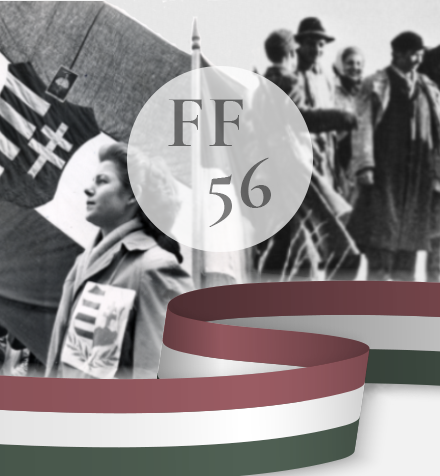Erika Papp Faber – My American Experience of October 23rd, 1956

The 1956 Hungarian Revolution and Freedom Fight is the most important event of my life. I did not state “lifetime,” because it occurred 10 years before I was born in Cleveland, Ohio. How could something that occurred 10 years before I was born be the most important event of my life? Had the 1956 Hungarian Revolution and Freedom Fight not taken place, my late father, László Buda, probably would not have been able to make the incredible sacrifice of leaving his homeland so that I would be born and raised in the United States and have the freedoms and opportunities that he could only dream about. Moreover, had I grown up in Hungary, I wonder if I would have had as much pride about being a Hungarian as I do having grown up in America.
“Budapest Riots!” screamed the headline on the afternoon edition of the tabloid, for sale in the luncheonette on Wisconsin Avenue. I had glanced at the headline out of habit, but my casual glance turned into excitement, as I tried to fathom what could have happened. I didn’t want to buy the paper, for I was on my way to an observance of the 500th anniversary of the death of John Capistrano, who, with John Hunyadi, had beaten back an overwhelming Turkish force at Nándorfehérvár (present-day Belgrade) in 1456, and I didn’t want to arrive there with newsprint all over my hands.
In the spring, Fr. Csaba Kilkián, OFM, had presented a series of radio talks about the Battle of Nándorfehérvár and the history of the Angelus bells, which the pope had asked to be rung, so all the faithful of Christendom might pray for victory over the infidels. Three weeks later, John Hunyadi and John Capistrano so thoroughly routed the Turks that they left Hungary alone for 70 years.
This glorious page of Hungarian history had inspired me to write a term paper about the affair, and so I was really interested in attending this observance in Washington, D.C. on October 23rd, 1956.
It was just a few short weeks ago that I had started my first year at Georgetown University’s School of Foreign Service, on a partial scholarship, one of only 25 women admitted in this third year of coed instruction. I was living away from home, in a rented room on a side street near the crossing of Massachusetts and Wisconsin Avenues, and I had to eat out, since I did not have kitchen privileges. I decided to have an early supper that Tuesday, since it would be too late to find a luncheonette open by the time the observance was over. That’s why I saw the paper.
So I was on pins and needles on the way downtown, impatient with the leisurely pace of the streetcar and bus. Surely the Hungarians attending this observance would have heard about what had happened in Budapest.
But I was sorely disappointed. When I got to the hotel, there was a nice crowd already assembled. I knew hardly anyone, having lived in New Jersey and New York since our arrival seven years previously. Finally, I spotted two acquaintances who also attended Georgetown, two years ahead of me, butted into their conversation, and asked them whether they had heard of the Budapest riots. But they dismissed my question as of no consequence. It hadn’t been in the papers that morning, and surely they would have heard. Rumors were always flying, and this headline was probably just some reporter’s fancy. Maybe I hadn’t read it right.
I was indignant. Of course I had read it right! There were only two words in the three-inch headline, you couldn’t miss it! So I sat through the program, to which President Eisenhower had been invited, but couldn’t come, sending instead a representative to give a short speech. But despite my interest in the topic, I was unable to concentrate.
When I got home, I turned on my radio, to try to catch a newscast and got the first – extremely short and tantalizing – report of what had begun on the streets of Budapest earlier that day (according to our time).
My first important test was scheduled for October 26th, and by rights I would have been cramming like mad. Instead, I tried to catch every newscast on every radio station, bought every paper in sight, and started each day with Mass, storming heaven with my feeble prayers. I agonized over the news, like every other Hungarian, everywhere.
Needless to say, I flunked that first test (not by much, actually). When I went to the professor to explain that I had my grandmother and relatives in Hungary, and had not been able to study properly, his laconic reply was: “You have to put yourself above these things!”
In peaceful Washington D.C., he almost became an American casualty of the 1956 Hungarian Uprising!
(originally published in MAGYAR NEWS, Bridgeport, CT,, October 1999)
Erika Papp Faber
Papp was born in Hungary, and left with her parents when the Russians and Germans were fighting around Budapest. After surviving the post-war years in
Germany, they came to the US in 1949, thanks to Papp’s American aunt and uncle who sponsored the family. Papp attended Georgetown University, and earned a degree in Foreign Service. For 14 years she edited a Catholic missiology magazine. Now she works as a freelance writer, and has written innumerable articles on Hungarian and religious topics. Her book “Our Mother’s Tears: Ten
Weeping Madonnas in Historic Hungary” was published by the Franciscans in 2006. Papp married a wonderful Hungarian, Oscar Faber, but is now a widow, living in Connecticut.”




Béla Király Ten Truths About 1956